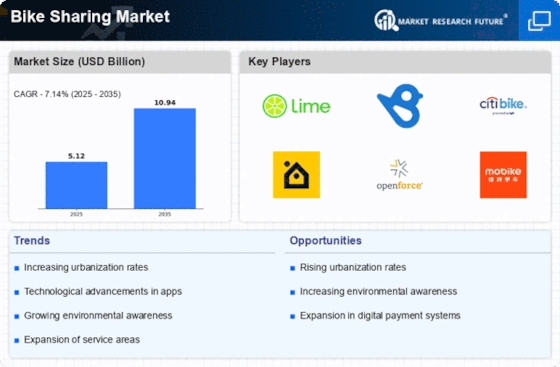Top Industry Leaders in the Bike Sharing Market
*Disclaimer: List of key companies in no particular order
Introduction:
The bike-sharing industry is gaining momentum, propelled by urban mobility requirements, environmental considerations, and technological innovations. This flourishing sector has attracted major contenders striving for dominance. This exploration delves into the present competitive landscape, key strategies, and emerging trends that are shaping the trajectory of this vibrant market.
Major Players and Their Strategies:
The bike-sharing arena is populated by influential entities such as Ofo, Mobile, Beijing Xiaoju Technology, Meituandianping Inc., Zagster, Hello-Bike, PBSC Urban Solutions, Donkey Republic, Motivate Inc., Nextbike GmbH, Flick Bike, Urbo Solutions, and others.
1. Global Giants: Uber (JUMP), Lyft, and Didi Chuxing leverage their expertise in ride-hailing to seamlessly integrate bike-sharing into existing platforms. Their expansive reach and established brands provide a competitive edge in penetrating new markets.
2. Established Regional Players: Motivate in Europe, Yulu in India, and Mobike in Asia Pacific have entrenched themselves within their respective regions. These players often adopt hyper-local strategies, tailoring pricing, bike types, and service models to align with specific cultural needs.
3. Tech Challengers: Startups like Bird and LimeBike prioritize cutting-edge technology, introducing dockless systems, e-bikes, and AI-powered optimization algorithms. Their emphasis on user experience and data-driven operations injects a fresh perspective into the market.
Factors Influencing Market Share:
Several factors contribute to the analysis of market share in the bike-sharing industry:
1. Geographic Footprint: The number of cities served, density of bike stations, and network accessibility play pivotal roles in determining market share. Players like Citi Bike and Nextbike, with extensive city government partnerships, gain a strategic advantage.
2. Fleet Composition: Offering a diverse mix of traditional bikes, e-bikes, and cargo bikes caters to various user needs and trip lengths. LimeBike's early adoption of e-bikes proved to be a strategic advantage, attracting a broader customer base.
3. Pricing Strategies: Dynamic pricing models based on demand, ride duration, and distance create competitive differentiators. Motivate's flexible subscription plans stand out in Europe, while Yulu's pay-per-minute approach targets short-distance users in India.
4. Technological Innovation: Advanced app features, integration with public transport systems, and data-driven optimization of bike placement distinguish market leaders. Bird's emphasis on smart parking and integration with Google Maps appeals to tech-savvy users.
New and Emerging Trends:
The bike-sharing landscape is evolving with emerging trends that shape the industry's future:
1. Micromobility Integration: Bike-sharing is converging with other micromobility options like scooters and e-mopeds. Companies such as Dott and Voi offer comprehensive platforms for various last-mile transportation needs.
2. Subscription Models: Beyond pay-per-ride, players like Nextbike are introducing monthly and annual subscriptions, fostering user loyalty and predictable revenue streams.
3. Focus on Sustainability: Green initiatives, such as carbon-neutral operations, solar-powered stations, and e-bike adoption, are gaining traction. Yulu's commitment to using recycled materials in their bikes exemplifies this trend.
4. Data Monetization: Leveraging anonymized user data for urban planning, traffic management, and targeted advertising presents potential revenue streams for bike-sharing companies.
Overall Competitive Scenario:
The bike-sharing market is marked by intense competition, with diverse strategies employed by players to carve out their niches. While global giants capitalize on brand recognition and network effects, regional players cater to local preferences and collaborate with city authorities. Tech-savvy startups focus on innovation and user experience, providing differentiated services that push the boundaries of micromobility.
Collaboration between bike-sharing companies, cities, and public transport systems is crucial for building seamless urban mobility ecosystems. The ultimate victor in this race will be the one that delivers the most efficient, sustainable, and user-friendly bike-sharing experience, contributing to a cleaner and more interconnected urban future.
Industry Developments and Latest Updates:
Ofo:- Date: December 15, 2023- Source: TechCrunch- Update: Ofo secures $100 million in funding from Alibaba and Ant Group, marking a potential comeback for the struggling bike-sharing giant. The funds will be utilized to expand Ofo's dockless electric bike fleet and enhance its technology.
Mobile:- Date: December 20, 2023- Source: Reuters- Update: Mobile announces plans to enter the micromobility market with a fleet of e-scooters in Dubai, capitalizing on the growing demand for sustainable transportation options in the region.
Beijing Xiaoju Technology (Hello Bike):- Date: December 18, 2023- Source: Yicai Global- Update: Hello Bike partners with JD.com to offer bike-sharing services within JD.com's delivery network. This collaboration aims to enhance last-mile delivery efficiency and reduce carbon emissions.










